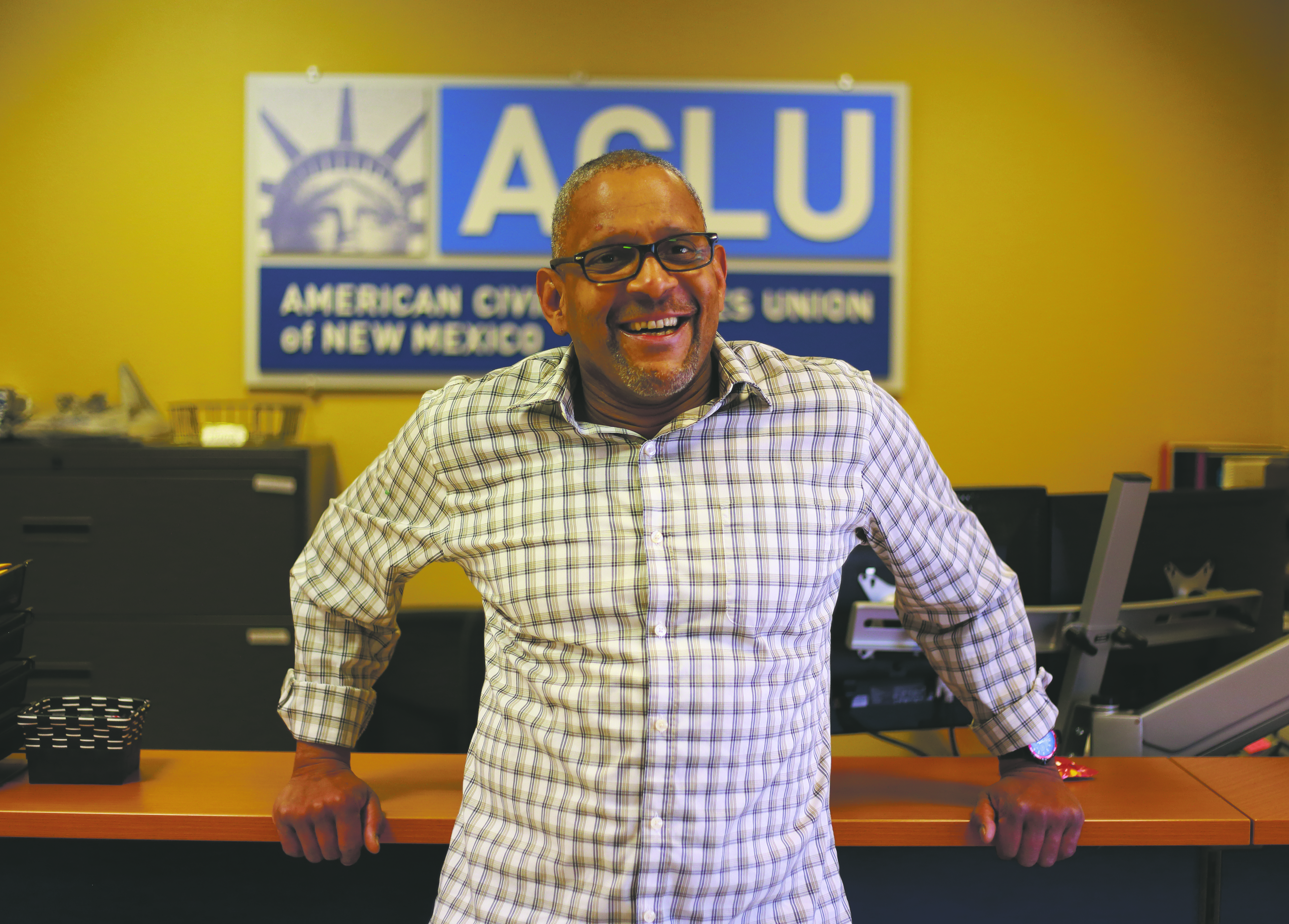Originally published in the Santa Fe Reporter on June 25, 2018. Written by Aaron Cantú.
Nine years after his release from prison, Barron Jones has become a leading advocate for criminal justice reform in New Mexico.
Following several years as a reporter for Española newspaper the Rio Grande Sun, he left for the ACLU of New Mexico in January to lead a project of his own. Now, Jones solicits input about criminal justice reform from people who have felt its effects, including both the formerly incarcerated and victims of crime.
ACLU-NM's Campaign for Smart Justice is part of a national effort by the organization to significantly reduce the number of people incarcerated in America, which is the highest in the world and costs about $1 trillion annually when factoring in social costs. Jones agrees that any serious effort at reform must include the perspectives of people who've been through the ringer.
"The goal of the Smart campaign is to pressure [New Mexico] politicians by bringing folks to meetings to say how the system has impacted their lives," Jones tells SFR. "How families are separated, how they can't get employment, how their parents are in prison."
The ACLU is one group generating ideas for three interim meetings scheduled for mid-July, where two bipartisan legislative committees will discuss various ideas for an omnibus criminal justice reform bill. Some lawmakers believe the departure of Gov. Susana Martinez at the end of year represents the first opportunity in a long while to pass laws that would cut back some of the social costs of incarceration that lead to further imprisonment, and save the state money from not opening new prisons. For example, Martinez vetoed legislation to limit the use of solitary confinement and help former inmates get jobs.
Rep. Antonio Maestas (D-Albuquerque), who co-chairs the interim Criminal Justice Reform Subcommittee, says the package is possibly the "first ever" major legislation of its kind in the state. It would implement various alternative-to-incarceration ideas like greater investments in diversion and rehabilitation programs for lower-level offenders, and would also address some of the collateral consequences of convictions, like the inability to find work, that lead to more crime and recidivism.
"I think the big thing we must do is some sort of expungement law to give relief for folks with dings on their criminal history," Maestas tells SFR by phone. "Once you pay your debt to society, you shouldn't continually have to come into road blocks."
The state's Sentencing Commission predicts New Mexico's prison population will steadily increase by 14 percent through 2027. Prison facilities for men and women are already experiencing overcrowding today. New Mexico is also one of 16 states where at least 40 percent of people in state prison were convicted of property or drug offenses. Finding ways to intervene here is key to reform, says Paul Haidle, an attorney at the ACLU who studies consequences of convictions.
"The answer is going to be either for us to build more prisons, or change how we're incarcerating people," Haidle says.
A major driver of incarceration rates is actually incarceration itself, which hinders people from re-integrating into society in a number of ways. One online database funded partially by the federal Department of Justice lists at least 680 various consequences for a felony conviction in New Mexico.
Many consequences are specific to licensed careers like law, medicine and nursing, dimming future career prospects. Obtaining things needed to run a business becomes essentially impossible. Other consequences directly affect more people than the convict; for example, the entire household of a person accused of fleeing to avoid felony prosecution or violating probation or parole can become ineligible for food stamps.
Then there's the whole social stigma surrounding a conviction, which can't easily be legislated away. It makes it harder not only to find employment, but housing too.
Senator Bill O'Neill (D-Albuquerque), an advisory member of the interim Courts, Corrections and Justice Subcommittee, knows this well. Prior to his ongoing stint in the Legislature, he led the Dismas House transitional living program for formerly incarcerated people. In the early 2000s, the organization tried to buy a house for its anchor site in Santa Fe, on Richards Avenue near Walgreens, but NIMBY locals ran them out of town. The house is now in the North Valley of Albuquerque.
"I think people need to understand that people are coming out of prison anyway," O'Neill tells SFR. "Ninety percent of inmates are released. Would you rather have them in supportive residential programs? … I think strongly that an investment in this would pay dividends, [and] it's borne out in statistics in other states that have gone down this road."
Rep. Maestas says many of the provisions that could be included in the omnibus bill come from legislation that had already been passed but vetoed in the past. He's especially adamant about disallowing the Motor Vehicles Department from suspending licenses for small traffic violations and failure to appear in court.
"States throughout the country reject [the practice]; we don't need prosecutors and cops and courts dealing with people who owe 50 bucks," he says.
Anybody with other good ideas can show up to the interim meetings at the Roundhouse July 16 through 18, or to a Smart justice program meeting at the Center for Progress and Justice on July 16 with Barron Jones. He especially invites both crime survivors and the accused to show up.
"I believe folks who have had similar experiences as myself, they've fallen through the cracks," Jones says. "Having their voices help us shape our legislative platform."
